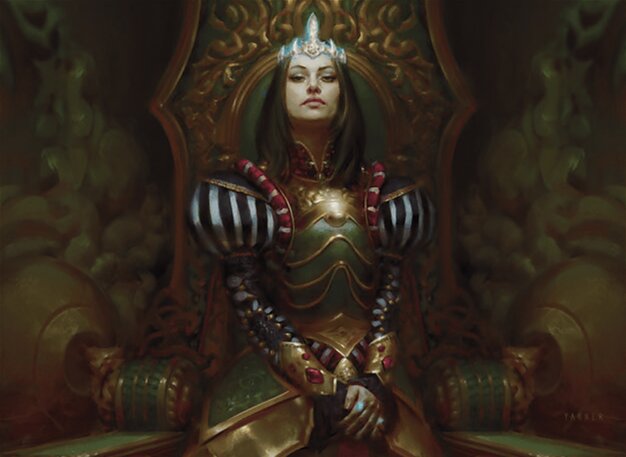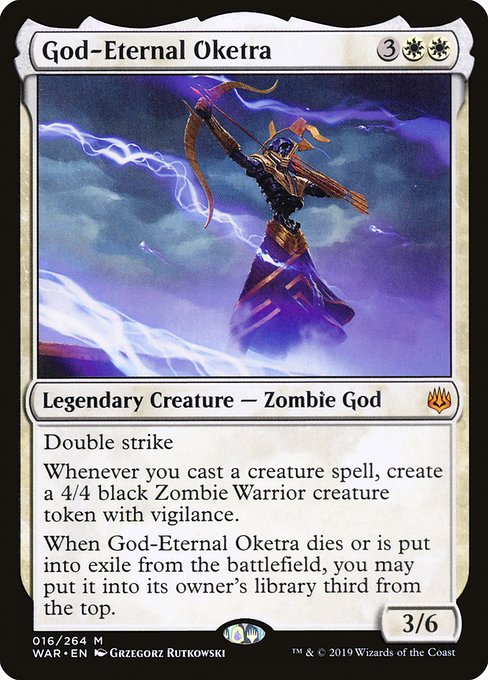Deck & Commander Strategies

Teval, the Balanced Scale
Utilizes landfall and milling to fill the graveyard and generate zombie tokens, leveraging graveyard recursion and incremental board presence.

Felothar the Steadfast
Focuses on toughness matters, using high toughness creatures that can attack with defender, combined with board wipes and token generation for control and combat dominance.

Queen Marchesa
Leverages multiplayer mechanics like Monarch and Myriad, creating multiple tokens and using equipment to enhance creatures, aiming to dominate through incremental advantage and aggression.

Saheeli, Radiant Creator
Generates energy and creates artifact creature tokens by copying impactful permanents, focusing on token swarm and artifact synergy to overwhelm opponents.
Gameplay Insights
- 1
Felothar's decision to play God-Eternal Oketra early introduced a strong offensive and defensive presence with double strike and continuous zombie token generation.
- 2
Marchesa's use of Blade of Selves to create Myriad tokens showcased synergy with multiplayer mechanics, helping to build board pressure.
- 3
Saheeli's ability to pay energy to create token copies of permanents provided flexible responses and potential for explosive board states.
- 4
Teval's combination of milling and graveyard recursion to produce zombie tokens allowed for steady incremental advantage, synergizing well with the deck's landfall theme.
- 5
The dynamic between Felothar's toughness-based creatures and Saheeli's artifact token copies created interesting combat scenarios requiring careful timing and strategic removal.
Notable Cards
-

God-Eternal Oketra
-

Blade of Selves
-

Path of Ancestry
-

Contaminated Aquifer
-

Wall of Omens
-

Expel the Interlopers
Gameplay Summary
The game began with each player deploying early ramp and utility lands to establish their mana bases, setting up for their respective clan-themed strategies.
Queen Marchesa focused on multiplayer mechanics starting with 'M,' including Monarch and Myriad, and deployed equipment like Blade of Selves to leverage Myriad tokens.
Saheeli, Radiant Creator started generating energy and prepared to create artifact creature tokens with haste, aiming to copy impactful permanents.
Teval, the Balanced Scale, utilized landfall synergies and zombie token generation through milling, while Felothar, the Steadfast emphasized toughness matters and board control with creatures that could attack despite defender and high toughness.
A key early moment was Felothar choosing to play God-Eternal Oketra, a powerful double strike threat that creates zombie tokens, signaling a strong board presence and token synergy to come. Throughout the game, players carefully balanced ramp, board development, and synergy exploitation.
Marchesa attempted to capitalize on her Monarch status and token creation, while Saheeli looked to produce multiple artifact tokens to overwhelm opponents or copy key threats.
Teval's milling and zombie creation added a graveyard recursion angle, providing incremental board presence.
Felothar's toughness-based aggression and inclusion of board wipes like Expel the Interlopers hinted at a control and attrition plan.
The interactions between Saheeli's token copying and Felothar's toughness-based creatures led to dynamic board states, with threats being duplicated or removed strategically.
The game revolved around maintaining board presence, leveraging unique clan mechanics, and timing attacks to exploit each deck's strengths.
The win conditions centered on Marchesa's aggressive multiplayer mechanics, Saheeli's artifact token swarm, Teval's zombie army from milling and recursion, and Felothar's resilient toughness-based combat damage.



























![Tarkir: Dragonstorm PACK TACTICS ft. Teval, Felothar, Eshki, Zurgo [ EDH / Commander Gameplay ] thumbnail](https://i.ytimg.com/vi/hZuA4Kdlt04/sddefault.jpg)







![Commander VS S17E9: Vish Kal VS Vilis VS Skullbriar VS Queen Marchesa [Magic: The Gathering EDH] thumbnail](https://i.ytimg.com/vi/PclCM0FiXKE/sddefault.jpg)
![Commander VS S13E7: Tolsimir Wolfblood vs Slimefoot vs Queen Marchesa vs Tajic [EDH] thumbnail](https://i.ytimg.com/vi/9vSts7GdaqU/sddefault.jpg)






